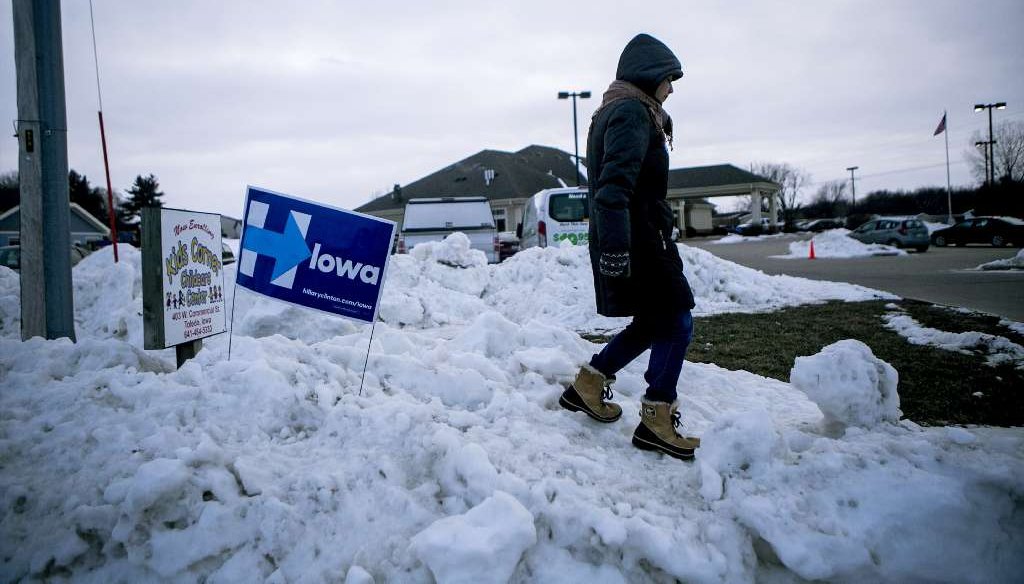Stand up for the facts!
Our only agenda is to publish the truth so you can be an informed participant in democracy.
We need your help.
I would like to contribute

Mara Baron, an organizer for Hillary Clinton, waits out in the snow to direct cars to parking areas for an event where the Democratic presidential hopeful was speaking, in Toledo, Iowa, Jan. 18, 2016. (NYT)
DES MOINES -- The art and craft of political fact-checking is not much to look at, usually. We sit at desks and read transcripts. We watch politicians on TV. We read documents and reports. On lively days, we talk with national experts on the phone. Every now and then, we might have a heated conversation with a press secretary.
So when PolitiFact decided to send a small team to Iowa, I jumped at the chance: Fact-checkers unbound from their desks!
Three of us spent a week driving the icy roads of Iowa and tramping through snow to watch candidates Hillary Clinton, Donald Trump and Bernie Sanders answer real questions from actual voters.
Sanders spoke in a small town hall building in Underwood before a room of about 300 people. Trump went before the cameras in a tiny exhibit room in the John Wayne Birthplace and Museum in Winterset. Clinton spoke in a little civic center in Toledo before an audience of about 200 people.
Over the years, Iowa’s first-in-the-nation caucuses have always garnered a heaping helping of criticism, some of it fair, for not being representative of the American electorate. The state is too rural, too white. What gives Iowa the right to go ahead of all the other states?
I might have agreed with that before this trip. But being on the ground in Iowa, with its population of 3.1 million, I can see that Iowa has something special. Because it’s small, Iowans get to see the candidates up close -- very close.
The Iowa events are almost entirely different than the campaign rallies I’ve covered over the years in Tampa, with thousands of people cheering for general election candidates. You’ll find music and speeches at those events, but little interaction.
In comparison, Iowa feels downright cozy and intimate. And for all the interconnectedness of 21st Century America, most of the events we went to weren’t widely broadcast, not even on C-SPAN.
As fact-checkers on the road, we found lots of things to check, some of which have already made the national radar and some not:
• Clinton said that just about every bill she introduced had a Republican co-sponsor. We rated that False, because the numbers didn’t bear it out. She sometimes had Republican co-sponsors, but not most of the time.
• Carly Fiorina claimed that abortions were at record numbers and climbing higher. We rated that False, because abortions have actually been declining since the 1990s.
• Trump repeated claims that Christian refugees from Syria aren’t allowed to come to the United States, a bizarrely incorrect claim that PolitiFact rated False months ago. There’s nothing in U.S. law or regulations that prevents Christian refugees from coming here.
This year’s race, though, isn’t about unadorned facts or policy prescriptions. It’s much more about personalities -- and voter anger. At a bar in downtown Des Moines on Wednesday night, we marveled at this topsy-turvy race and wondered how we would regard it years from now.
Two of the biggest personalities of the 2016 race, to me, are Sanders and Trump. And I left Iowa thinking they have a ton in common.
They’re both angry. They both hate the Iraq war, Goldman Sachs and the media.
At the Underwood rally, audience members brought their problems to Sanders, and his answer to every one of them was a massive government program. A working mom was struggling with a child who has epilepsy. Sanders talked about his proposal for a single-payer, Canadian-style health care system. A young man complained about crushing student loans; Sanders said he wants universities to offer free tuition.
As for how Sanders would get such plans through Congress, Sanders called for a voter revolution, with the public organized and forcing change. I recall another candidate who said much the same thing back in 2008, and actually did create a group to harness voters’ desire for change. That was Barack Obama and his group became Organizing for America. Yet Congress remains gridlocked.
Meanwhile, Trump simply tells voters he’ll fix things without any detail. China exerting too much influence on the world stage? Trump will stop it. Immigrants coming to the United States? A big wall, paid for by Mexico. Terrorists recruiting over the Internet? He’ll fix that, too.
How Trump will do all these things, he doesn’t really say. He’s more a person of grand pronouncements than policy details.
Sanders and Trump both seem to think, though, that tough problems have relatively simple solutions, if only people would get angry enough to vote them into office.
Both seem to sincerely believe they’ve crafted campaign messages that can take them all the way to the White House.
And who knows, maybe they have. In 2016, anything is possible.
Our Sources
PolitiFact

















































